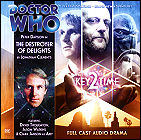 The Doctor and Amy are saved from a fiery fate aboard the Ice Warrior vessel by the Black Guardian himself, but it quickly becomes apparent that something is amiss – the Guardian’s power is far from immense. In fact, it’s fading – and he can’t even find the fifth segment of the Key to Time. The most likely locations in space and time have turned up nothing. The Doctor decides to leave the hunt to chance, picking a random destination…and yet he and Amy still arrive in 9th century Sudan, which was among the likely locations. The time travelers are caught in the middle of a struggle between the Caliphate and a rebel lord who has not paid his tribute in gold to the Caliph in two years. There’s enough intrigue to go around, except that the gold-hoarding governor is the Black Guardian – now rendered powerless and trapped in human form – and the Legate of the Caliph coming to wage war upon him is the equally impotent White Guardian. Their machinations have brought an alien presence to Earth…a presence which could completely rewrite history unless the Doctor and Amy find the next segment of the Key.
The Doctor and Amy are saved from a fiery fate aboard the Ice Warrior vessel by the Black Guardian himself, but it quickly becomes apparent that something is amiss – the Guardian’s power is far from immense. In fact, it’s fading – and he can’t even find the fifth segment of the Key to Time. The most likely locations in space and time have turned up nothing. The Doctor decides to leave the hunt to chance, picking a random destination…and yet he and Amy still arrive in 9th century Sudan, which was among the likely locations. The time travelers are caught in the middle of a struggle between the Caliphate and a rebel lord who has not paid his tribute in gold to the Caliph in two years. There’s enough intrigue to go around, except that the gold-hoarding governor is the Black Guardian – now rendered powerless and trapped in human form – and the Legate of the Caliph coming to wage war upon him is the equally impotent White Guardian. Their machinations have brought an alien presence to Earth…a presence which could completely rewrite history unless the Doctor and Amy find the next segment of the Key.
written by Jonathan Clements
directed by Lisa Bowerman
music by Simon RobinsonCast: Peter Davison (The Doctor), Ciara Janson (Amy), David Troughton (The Black Guardian), Jason Watkins (Legate of the Caliph), Jess Robinson (Nisrin), Bryan Pilkington (Prince Omar), Paul Chahidi (Hason), Will Barton (Djinni), David Peart (Vizier)
Timeline: between The Judgement Of Isskar and The Chaos Pool
LogBook entry and TheatEar review by Earl Green
Review: A not-too-terribly serious exploration of a historical setting that hasn’t been used before in Doctor Who, Destroyer Of Delights is entertaining, and hews closely to the new TV series’ tendency to paint historical characters in an ironic, anachronistically modern light. Of course, when some of the “historical” characters in question are actually existing characters from the Doctor Who mythos who have inserted themselves into history, perhaps one can get away with it.
David Troughton makes an impressive entrance as the Black Guardian, and while he’s no Valentine Dyall, he’s close enough. But the facade soon crumbles and Troughton assumes his normal speaking voice – one which I found a bit distracting, because his vocal resemblence to his late father is so striking, I had a hard time not picturing Patrick Troughton. Jason Watkins isn’t exactly Cyril Luckham either, but by the time he appears in the role of the White Guardian, the story has established that so much about the two Guardians is pure artifice, including the appearances and voices that we had previously accepted as theirs. The rest of the cast does well with the material, though it raises the age-old question of why a bunch of born Arabic speakers are speaking “BBC English”; the story establishes that the TARDIS is certainly nearby, so perhaps the timeship’s ability to translate languages for its occupants is to blame.
There’s no such handy excuse, however, for what may take the cake as the worst music score for a Big Finish audio story to date. The cheesy, blatantly-synthesized stereotypical “Arabic music” is just plain silly, and I found it took me right out of the story. The rest of the sound design was top-notch, but I found myself wishing that the story didn’t have music, period – this was too silly even by the standard of the all-synth scores of the Davison era (which was actually a musically rich period for Doctor Who). If the composer was trying to emulate the early ’80s synth scores… this was a less-than-flattering homage. (Come to think of it, Judgement Of Isskar had a distractingly odd score too, leaning heavily on very-well-worn orchestral samples that I remembered Chris Franke using to score Babylon 5 ten years ago. What’s up with the music, guys?)
